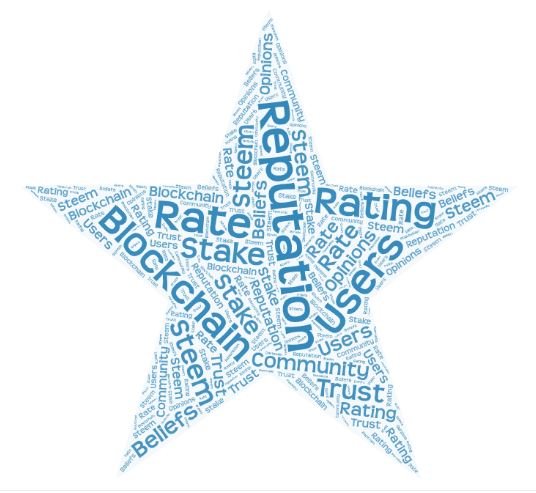Steem Proposal - Account Rating System

Dear Steemians,
I am going to ask upfront that you resteem this post if you agree with it or think it needs to be discussed more. My hopes is that it will spur some discussion which will lead to an SPS proposal or some other method for this (or some derivative of it)to be included in the next HF. Whether you agree or not, your comments are encouraged and appreciated.
I am coming to you today with a proposal for an account rating system. This proposal would not change the current "Reputation" algorithm, but does suggest a name change for the sake of clarity.
Background/Problem: The way that Steem distributes rewards is dependent on a community consensus of which posts deserve the rewards. This consensus is reached through the use of upvotes and downvotes. Downvotes, though a necessary aspect of the Steem blockchain, carry a very negative social connotation. This is compounded by the fact that downvotes have a direct affect on Reputation. Because the weight of a downvote is directly proportional to the downvoter's Steempower (SP), users with less SP are subject to malicious attacks on their social standing even though they may have generally favorable interactions on the blockchain.
A secondary problem under the current Reputation algorithm is that reputation can be, and often is, bought. Users have the ability to upvote themselves via their same account, paid bid bots, or through alternate accounts (alts). This is a privilege of stake, however, it adds ambiguity to the reputation system as accounts with generally unfavorable community interactions often show as having some of the highest Reputation scores in the community.
There have been numerous instances in which large sections of the community expressed a desire to eliminate downvoting. This is a present day issue (this article is being written in the midst of the #SteemHostileTakeover) and is a condition of @proxy.token's proposal for witness votes. These requests are often answered with the explanation that downvotes are used to provide consensus of reward pool distribution and are a necessary part of Steem's Proof of Brain concept.
Analysis: A Google search to define reputation pulls up the following definition: "the beliefs or opinions that are generally held about someone or something". Beliefs and opinions are an aspect of social interaction. Steem is a Delegated Proof of Stake (DPOS) system. In such a system, influential weight is given to those who hodl the token. Therefore, the current Reputation system falls in line with that overall concept. However, the term "reputation" is inappropriate because it doesn't have a strong mechanism for representing the general beliefs or opinions held about that account.
In order to build a system to represent general beliefs and opinions, we would have to seek a method which gathers input from the general population. General input relies on the input from all participants being weighted the same. To put it another way, no belief or opinion is more valid than another. Therefore, such a system could not include stake as a variable.
Reputation is dynamic. Unlike product reviews in a store like Amazon or seller reviews on Ebay, a social reputation is dynamic. A person can change their interaction and thereby change the opinion the general population shares about them. Any system aiming to capture general opinions and beliefs should take the dynamic aspect into account.
Solution: The problems of the current Reputation system can be largely mitigated through the implementation of an Account Rating System (ARS). Under the ARS, each member would have the opportunity to rate the interactions they have had with a particular account on a range of 1 to 5 stars. The account's RATING would be an average of all the RATEs that account has received within 180 days since it's last post. RATEs would expire after 180 days. An account would only be able to rate another account once every 180 days.
Concerns and Mitigations:
What would prevent using alternate accounts to bolster one's own RATING? This could be mitigated in several ways.
- First, because the RATEs expire, there would be an effort cost to update the rating after it expires.
- Second, an ARS blacklist would be developed of known alts or accounts known to be under the control of a different individual or entity. These accounts would not be allowed to RATE other accounts within the ARS.
- Third, in order to RATE an account as either 1 star or 5 stars, a reason would have to be provided. Automating such response would likely lead to placement on the ARS blacklist.
Having a Reputation score and an Account Rating could be confusing. we don't need two systems which do the same thing.
- The two systems do not do the same thing and could be complimentary to each other.
- Renaming "Reputation" to "Importance" could clear up the confusion. As stated before, the current Reputation system does not do a good job of capturing or communicating general beliefs or opinions about an account, but it does give a very good indication of the importance of the account. Stake and social status are both aspects of importance and Reputation is a pretty good indicator of both.
What benefits would such a system bring to Steem?
- The ARS will serve as another variable which decentralized applications (DAPPs) can use however they see fit.
- It can be used as a filter for joining a community.
- It could be used as a more effective means of controlling spam
- It would offer social protection (or remove social liability) to those targeted by a single high staked user.
- It would encourage good behavior and decentralized conflict resolution on the Steem blockchain
- It would give users an ability to course correct and improve themselves without having to depend on a large-staked user.
- It encourages users to stay on the chain, creating more users of Steem and adding to the currency's potential as a medium of exchange.
- In the future, who knows?
Conclusion
Steem is a unique blockchain in that it was built upon both the technical aspects of DPOS and the social aspect from day one. This creates a user base that is rather unique among cryptocurrencies. Implementing a rating system based on social aspects allows the blockchain another variable which more aptly represents the general beliefs and opinions about an account. A focus on this variable will lead to greater public acceptance of the necessity of downvotes for the purposes of consensus on payouts.
Thanks for reading. Please don't forget to comment.
P.S.
If you'd like to see my previous posts on how reputation works, click here or here.

=============================

=============================

Join the new Discord channel dedicated specifically to poetry
Block Chain Poets
Where poets support other poets.
Shared by a wonderful Steemian @mondoshawan in the Steem Terminal. He felt your energy was positive enough to share, and so do I.
ANYTHING positive is a good thing. Let's see where this goes... shall we? Mow to resteem and give your post some love !tip
😎 thanks BroSir! Forgot to mention that I passed it on C²...
Saw that... beat me to it haha! But again, worth sharing...
Interesting thought and yes the reputation system is really flawed. I'm just glad I haven't paid a single bid bot to get to nearly rep 70 (it is possible).
I can see exploits happening with the rating system you propose such as rating farm accounts that can get paid to alter ones rating. A bit like what happens with FB reviews as you have businesses set up to give 1 stars and it has destroyed business (sadly).
I just wonder if it's possible for the current reputation system to be based on a combination of factors such as upvotes received, comments received, resteems, replies and conversation thread as that would be a mark based on already existing information in the database and wouldn't require users to leave feedback?
Thank you for your support and your comment. There will always be ways to exploit the system, but I think the three items I discussed (expiration of rates, filtering with a blacklist, and requiring of a comment) will reduce both the likelihood and the the impact of a lot of these types of attacks. It would definitely require some flexibility.
I think the User Authority (@steem-ua) uses an algorithm which takes into account some of the things you mention, which is also a great avenue to include. Perhaps the end state would be a compilation of all three scores. There is also a 4th score with @steemchiller's voting CSI score.
One thing to consider is that user feedback offers some qualitative analysis which can't really be represented in the numbers. A person reading the rates left for a specific account can gain a better understanding of that account's presence. Thanks again!
You're welcome man and I agree too that a combination of different things we mentioned would be a better way of doing it. Something that asseses multiple variables always helps to build a better picture 🙂
User feedback and social proof are vital for businesses and have quite a strong influence when you use sites like Amazon for example. When you see more reviews and star ratings it might sway your decision to go for them vs another seller.
Food for thought
@moeknows I upvoted your blog post to help improve the visibility of your proposal. However I don't agree with certain aspects:
I don't agree. Experience is a factor that makes some opinions more qualified than others. So account-age should contribute as a factor.
But also, I don't think a better REP system on the same DPoS protocol would be enough. So it will require a new protocol (optimized for a social blockchain) and then a good implementation of that protocol (a fixed REP system).
I´ll leave the cross-post reference here for further debate:
Reputational Enhanced Delegated Proof-of-Stake (REDPOS)
That is a good point and one that I considered. However, I think you and I coming at it from different problems. I think you are more or less looking into governance issues and I am looking more into social issues.
While I think the ARS could be a factor in a number of different blockchain aspects, I am not necessarily advocating for any at this point. I think the system would have to be in place for a while before it could ever be applied to anything like governance. That being said, it could easily be coupled with other factors and weighted appropriately for the information it provides.
For example: Account A has a generally unfavorable rating. It's age is 3 years, it has 2,000,000 SP. Should that account be allowed to do x?
Maybe. The point is that the ARS is only one factor in many. It is a single variable and within the scope of that single variable, everybody has to have an equal voice.
That's also why I advocate for keeping but renaming the current "Reputation" system. Does offer some information and I would say that you can tease out the importance of an account based on their rep score. The idea is that, if all other factors were removed, a person with more SP might be considered more important than someone who is not. Likewise, a person who is has garnered a high amount of support might also be more important than a per who doesn't.
In my mind, dapps and blockchain applications could develop their own algorithms how they see fit.
suitability rating = Importance Score * CSI score * UA score * Account Rating * account age
or something like that.
As @blocktrades explained, the REP system was quickly programmed as a bandaid for STEEM. What I say is that DPoS is a blockchain protocol that suited Bitshares well. Bitshares is no social blockchain.
For a DPoS protocol to really serve a social blockchain implementation, it needs to evolve into a REDPOS, because the human aspects of accounts need to be an inherent part of the protocol, not just an add-on, a bandaid.
DPoS is like a "general use" blockchain protocol and STEEM was built on that. A "NEWSTEEM" will face similar issues if a social blockchain oriented protocol isn't developed first.
Ok, I just think the devil will be in the details of how that protocol works. In that sense, I think any algorithm will have to take subjective qualitative analysis into account. The ARS could be a possible avenue for that information.
Interesting notion and deserves some more thoughtful eyes, passed on as requested.
Thank you, I appreciate it. I really feel like something like this could be really useful to a lot of dapps. Thanks for the resteem.
I like too much the idea and though it could be improved in some aspects I think you developed it rather clearly and accurately.
Let's see what people think on this.
On my hand gave it my resteem to see if it can reach more views. I will also promote it on some discord servers.
Good job @moeknows ;)
Thank you very much. There most definitely are areas for improvement. Thanks for reesteeming it. Perhaps we can all come together to refine the idea further.
🎁 Hi @moeknows! You have received 0.1 STEEM tip from @wesphilbin!
Check out @wesphilbin blog here and follow if you like the content :)
Sending tips with @tipU - how to guide.
!trdo
Congratulations @wesphilbin, you successfuly trended the post shared by @moeknows!
@moeknows will receive 4.94605238 TRDO & @wesphilbin will get 3.29736825 TRDO curation in 3 Days from Post Created Date!
"Call TRDO, Your Comment Worth Something!"
To view or trade TRDO go to steem-engine.com
Join TRDO Discord Channel or Join TRDO Web Site
@tipu curate
Upvoted 👌 (Mana: 5/10 - need recharge?)
@alliedforces curate
Keep up the great work and join us in The Castle sometime!
The #spreadlovenotwar curation campaign is under the guidance of witnesses @enginewitty and @untersatz.
I do think this has a lot of merit and should be considered
resteeming
Thanks, JJ! I appreciate your thoughts and the resteem!
MOst welcome ;)